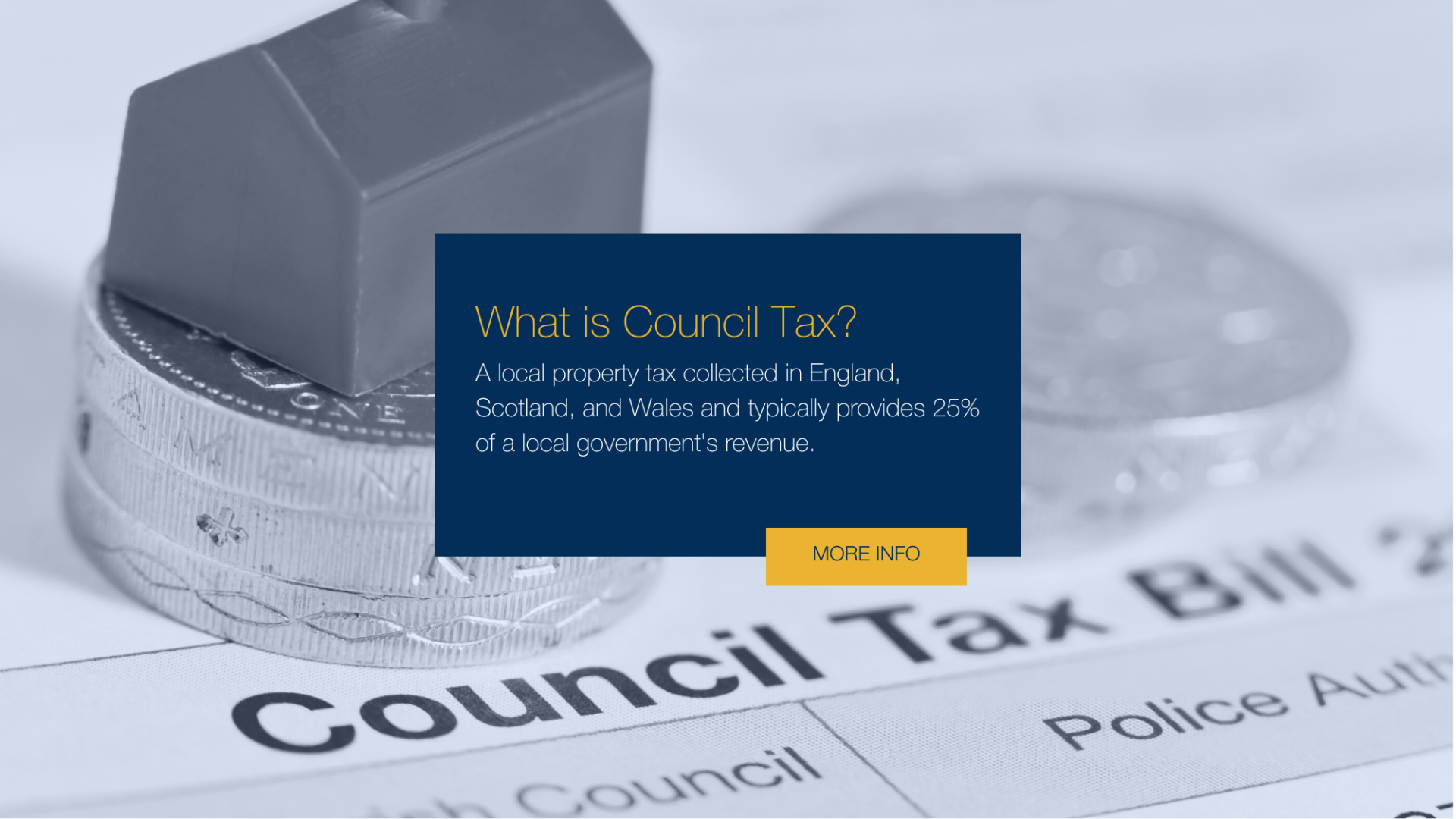Council Tax
 By Shaun Adams
Subscribe to newsletter
By Shaun Adams
Subscribe to newsletterWhat is Council Tax?
Council Tax is a local property tax collected in England, Scotland, and Wales and typically provides 25% of a local government's revenue.
Who pays it?
So long as you are 18 or older, you will have to pay Council Tax regardless of whether you own or rent your home.
How much does it cost?
The amount of Council Tax that each household pays depends on three main factors:
Your property's valuation band
Your personal circumstances
Current council budget needs
Wales bases its Council Tax Bands on property valuations taken in 2003. England and Scotland still employs property valuations taken in 1991 – the same year as when Council Tax was first introduced in 1993.
If a property has been altered since 1991, or didn't exist then, the valuation is based on what it would be at 1991 levels or 2003 levels for Wales.
Within England and Scotland there are eight Council Tax valuation Bands, ranging from A (the lowest) to H (the highest). In Wales there are a total of nine valuation bands, ranging from A to I. The higher the value of your home in 1991 (or 2003 in Wales), the higher Band it will fall into.
In England for example, homes valued up to £40,000 would fall under band A, while those over £320,000 would fall under band H. The corresponding Council Tax charge for a property in band A would be one third of the charge for a property in band H.
There is a ceiling beyond which the rate doesn't rise, however which is £212,001 in Scotland, £320,000 in England and £424,001 in Wales.
If you want to check your valuation Band, visit your local council website. https://www.arun.gov.uk/counciltax
What does it pay for?
This is a question that millions of hard-working households don't know the answer to and it varies from council to council – but your Council Tax will go towards funding these 11 local services and amenities:
- The local library: In addition to book-lending services, public libraries usually offer community classes, special events and computer facilities – which your Council Tax pays for.
Police and fire services: Both receive funding from multiple sources, one of which is your Council Tax.
Street cleaning and waste collection: Rubbish collection, recycling and street cleaning are all paid for from the Council Tax pot. This includes commercial collections too.
Water and sewerage services: In Scotland, Council Tax includes the cost of water and sewerage services.
Parks and recreation: Maintenance and upkeep for public spaces, parks, galleries, theatres, museums, leisure centres and community swimming pools is all paid for with Council Tax. This can also extend to museums, which means free entry.
Social services programs: This means everything from day care for children to assistance for vulnerable individuals such as those with dementia.
Schools, education and youth services: In England, schools are funded by the central government's Dedicated Schools Grant. However, Council Tax is sometimes used to help boost education and fund programs such as after-school care or at-risk youth services. In Scotland, schools are funded entirely by Council Tax.
Housing provision and advice: Council housing is funded through the local council, often with the use of this tax. People who are homeless or living in unsafe conditions are prioritised.
Community development: Councils can use the tax revenue to undertake projects which might benefit the growth of their community. Glasgow City Council for example, recently funded the completion of the M74 motorway and Riverside Museum with Council Tax.
Street lighting and road and bridge maintenance: Many road bridges are owned and maintained by the council so maintenance and repairs need to be paid for by this tax. Street lighting and council car parks are also included.
Administration and record keeping: Council Tax pays for the cost of local elections, as well as administrative issues, including registrars of marriages, deaths, and births. Mortuary and cemetery services may also be covered by Council Tax, as well as the administrative costs of running a council.
How can I pay?
Council Tax is typically paid as an annual lump sum. But you can choose to break it down into monthly instalments (either 10 or 12) or into 43 weekly instalments. Payments can be made to your local council via direct debit and standing order, although you can also choose to pay at a Post Office with cash, cheque or debit card. Your local council website will detail which instalment plans and payment methods are accepted.
Can I get a discount?
Council Tax bills are based on at least two adult occupants. However, you could benefit from a discount if:
You live alone or with minors (25% discount applies)
No occupants qualify as adults according to Council Tax regulations (50% discount applies)
Everyone in the home is a full-time student (100% discount applies)
On the other side of the coin, some councils are now charging Council Tax of between 150% and 200% on empty properties to motivate owners into renting them out and help alleviate the UK housing crisis.
You might also be eligible for a Council Tax Reduction (called Council Tax Support) which replaced the Council Tax Benefit in April 2013. You'll need to apply direct for this kind of assistance.
What if I'm not happy with how my money is being spent?
If you don't think your council is performing to a high standard, or you disagree with the way it spends your council tax, you can contact them and tell them or issue a formal complaint. If you're not happy with their response contact the Local Government Ombudsman helpline.
What happens if I can't pay?
If you miss a Council Tax payment you'll get a reminder notice giving you a week to pay. If you fail to make payment, you'll have your right to pay in instalments removed and the year's Council tax will become due immediately. At this point a second reminder notice will be sent out. If a third and final reminder is sent, the council may take legal action against you.
If you are struggling with payments, contact the Citizens Advice Bureau.


